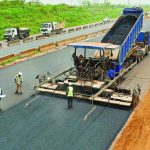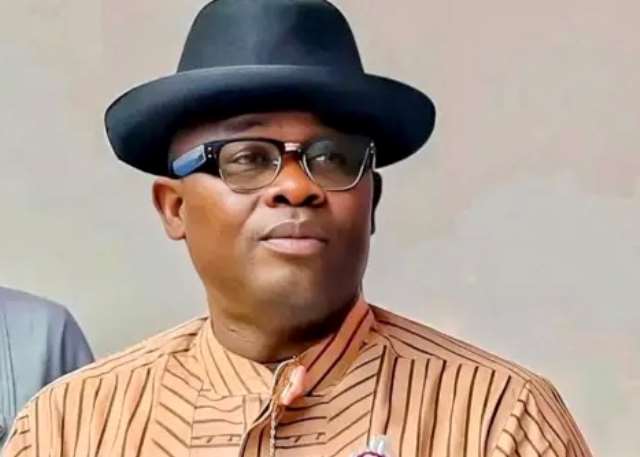In 2017, an ECOWAS Court sitting in Abuja gave a landmark judgment in favour of actress and activist, Dorothy Njemanze and two others against the Nigerian Government for unlawfully arresting, detaining and declaring the ladies as prostitutes in Abuja.
The court imposed ₦18 million fine on the government with N6 million each to be paid as damages to the women over the sexual violations meted out on them by military operatives, police, and officials of the Abuja Environmental Protection Board (AEPB), who claimed to be acting on the directive of the federal government.
This ruling set legal precedence effective in all the ECOWAS countries as Nigeria became the first country to be pronounced by a court to be guilty of gender-based violence.
Miss Njemanze is also the Executive Director of the Dorothy Njemanze Foundation (DNF), an organization dedicated to promoting and protecting the rights of women and girls in Nigeria, as well as tackling sexual violence and providing a round-the-clock response to women and girls affected by Sexual and Gender-Based Violence (SGBV).
In this exclusive interview with Persecondnews AJUMA EDWINA AMEH, she shares her experience about how she got justice, as well as her fight against SGBV.
Opinion on Sexual and Gender-Based Violence (SGBV)
To unpack Sexual violence I would say it is unwanted sexual contact forcefully perpetrated on anybody who does not consent to it. It could be verbal, physical, and it could also be emotional.
Conditioning people’s mind to the point that they have no option than to give you sexual favours or yield to your sexual gratification, which is a strategy deployed in sextortion.
Sextortion is a concept that is used a lot in educational institutions, religious institutions and on the home front or even to get jobs. You’ll hear things like ‘if you don’t sleep with me, you’re out of school’.
You have not beaten the person, but you have conditioned the person to understand that the person is going to be at a loss if the person does not participate in sexual activity with you, whether or not the person wants to, that is sexual violence.
Not all physical sexual violence involves penetration. Groping is physical sexual violence, the penetration doesn’t even have to be with only a body part, it could be with a foreign object. Because of the patriarchal normative practices in Nigeria, there are more females prone to sexual violence than males.
Technologically facilitated sexual violence
Technology has bridged a lot of gaps. While technology is bridging gaps, perpetrators are also utilizing on the fact that technology is available and benefiting from the gaps that are bridged. Before you need to be close to somebody’s house, but now all you need to do is register an account on a social media platform, mingle with people and start targeting people.
What checks are in place that can intercept abuse of use of technology? Sometimes when we are checking only the use of technology and access to the internet, we are forgetting that there are things these days called security cameras amongst other things. Installation of security cameras in some places could be infringing on the right to privacy of your domestic staff, an example is when you have a security camera installed in their bathroom or bedroom.
There are also cases where to get jobs, some people make you declare your nudes and other things. But at the core of it we have the high level of poverty, illiteracy, the ignorance of legal provisions and procedures being key enablers of perpetrators of sexual and gender based violence. The people in law enforcement are only products of society, so if you took a case for instance to the police and said I knowingly exchanged nudes with my partner but because the person is abusive and I decided to call it quit, the person has promised to post my nudes.
The next thing the police will do is slut shame you for exchanging your nudes. I may consent to exchanging my nudes, but I didn’t consent to distribution of the nudes, so the cyber crime act comes to play here. The cybercrime act recognizes your intention. If your intent of distributing the nudes is to hurt me, you can not give another reason for distributing the nudes. Why is it that when issues affect women or different categories of women, the goal post shifts?
DNF supporting survivors of Sexual and Gender-Based Violence (SGBV)
Depending on what they want when they reach out to us online, we provide services. COVID has thought us that we can provide counselling services online without physical contact, and so it has helped to bridge many gaps, especially for people who live with their pepertrators.
For the physical services, ministries, departments, and agencies refer cases to us and we also refer cases to them, so it’s a collaborative process. we also have a lot of partnerships with different civil society organizations, because there are services we can provide and there are some we can’t. This is because their location places the CSOs in a better position to provide services. We provide free and confidential medical services, and what we found out is that a lot of reports from the medical services are used in courts to strenghten cases of survivors.
Many times people do not take that as an important value of the medical services. asides saving the life of the survivor, scientific evidence that can corroborate survivor experience is gathered from medical services.
Challenges victims of SGBV face
Navigating law enforcement experiences. With police, it is very expensive to access justice. Generally in nigeria, it is very expensive to access justice, but with police it is more expensive.
If your access to justice is through the police, then it’s going to be more expensive because we still have police stations requesting for payment of files, For some stations you will even pay for them to listen to you before you write your statement. Then, to visit the crime scene you’ll pay, you’ll also pay to fuel their vehicle, an average range is N25,000.
As many times as visit to the crime scene happened you will pay. if it’s a rape case, and medical assessment needs to be done, the bill is already on the survivor. even if the survivor is two-year old, the survivor is expected to pay the suvivor’s medical bill and the medical bill of the pepertrator or perpetrators because you want to access if the person has herpatitis, HIV or any STDs. When you finish doing it in the first month within 72 hours of administration of post-exposure prophylaxis (PEP), you also have to repeat those tests in the third month. many people do not trust the police, many people are scared of NAPTIP, many people are scared of anything law enforcement because they have heard a lot of stories of corruption, many people feel they will not be believed, many people don’t know legal provisions and procedures, so they trust us and bring the cases to us.
So, what we do is that we report cases on behalf of survivors, and what does it do? the numerous reports of forced settlements by law enforcement can be checked, so it means you can’t close a case without telling us that reported the case, and the Violence Against Persons Prohibition (VAPP) Act lets us know that we can report cases on behalf of people who believe they are in danger.
We also provide safe shelter. we have a shelter. We provide shelter because there is no exit strategy for women in distress in Nigeria and it’s a big problem because many times different laws and normative practices want to believe that support for women in distress should be determined by a relevant male in their lives. So what happens to the emotions of the women, why can they not be recognized as adults, why cant they access resources by themselves? These are the realities.
There is also duplicity of roles and how it affects cases. So, a trafficking case happens and the person has reported to the nearest police station around there, the next thing you’ll hear is that NAPTIP does not want to touch the case as long as the police have touched the case or if NAPTIP touches the case, police will say they do not want to touch the case as long as NAPTIP has touched it.
Difficulty procuring retraining orders is another thing. So our work is just simply to be there to document survivors’ reality, and make it easier for survivors.
Safe homes for survivors
In FCT for instance, the Ministry of Women Affairs has a 40-bed shelter and there’s nobody there. We have a 14-bed space and we arte almost filled to capacity, we don’t even know where to get food from every time.
One will expect that these issues we have spoken about, every normal thinking human being should be happy to key into these, but the shameful thing is that some people have said we are making women not to respect their husbands with our empowerment, but that is not the issue. We are trying to say women are emotional beings with human rights which should be respected and if they identity a potential threat, the community, society and the government is duty bound to protect who ever feel threatened in the interest of our sheer humanity.
So if somebody in the habit of hitting or beating his spouse, but occupies an important position, as a head of a cooperate institution that has the capacity to throw their support, it doesn’t matter how you sugarcoat it, the person is never going to buy into the idea, so it makes me question the essence to which big corporations or organizations buy into the idea of protecting our sheer humanity. There are different dimensions to what we do.
There is provision of health services, there is school fees, there is economic empowerment, business empowerment, there is housing, capacity building. There is a role the government and private sector can do. There is massive irresponsibility, that is why perpetrators are having a field day.
Nigeria’s Justice system as regards SGBV
In writing and in theory, there are a lot of policies that exist. There is the National Action Plan (NAP) on Implementation of UNSCR 1325, there is the VAPP, and the Child Rights Act, amongst others. At the state level, a lot of these legislations I’m talking about have been grossly watered down. I think it is a disservice to any group of people. The National Assembly as it is constituted has representatives from different parts of Nigeria. Anything that comes from the national assembly that gets to be watered down at any place is a principal enabler of corruption, I think at best all those things should be strengthened not watered down.
For instance, for Child Rights Act, some places where the Child Rights Act recommends life imprisonment for violators, some states have watered it down to 10 years. I think those states are primary enablers of corruption and they are pamperers of perpetrators of violence against vulnerable people. It’s a shame, I can’t even pretend about it.
Then, with implementation what is access to justice without investigation? The amount of corruption that rest in the different investigative offices, whether it is the investigative process of the police or the legal department of the police, the amount of corruption there inhibits access to justice. How many of these people have devices they can use effectively in dispensing justice? And then, I am a strong advocate of investigations being done on camera or if you don’t want to use camera, let there be audio recording of the investigation processes.
That way we can tell who is forcing who to talk. Because so many times there is wrong counsel given by people in those offices to scare those seeking justice from starting or continuing the process. So, maybe if we had a system in place mandating everybody investigating any of these sexual and gender-based violence-related cases to ensure that they only do it on record and any investigative process that is not done on record will not count. If this is the case, we will be more serious.
If the governor, for instance, does not recognize 35 percent Affirmative Action and does not have a minimum 35 percent of his or her staff representing this gender, I don’t expect that that person will have a problem where SGBV is not treated as an emergency, but treated on grounds of tokenism. So these are things to call out.
When SGBV response is left as a pet project of governors’ wives, then there is a problem. How does the Ministry of Humanitarian Affairs support survivors of SGBV in seeming times of peace? Is not only when there is a Boko Haram crisis or there is a crisis in one place or the other that we provide relief materials and others, there are so many survivors who need relief materials.
When some survivors run, they run with just their lives, they run naked, and it’s a neighbor or good samaritan that gives them cloth to cover. Their certificates and things are trapped in the perpetrators houses, so when they run that way how can they be useful to themselves with the skill set they have acquired over the years by assessing resources to stand on their own. Why does society keep trying to force them to be dependent on the external family system that are offended with them for daring to point out the fact that they feel hurt by the normative patrachial practices. When we say break the circle, we must break the circle in practice. In writing there are policies that exist, but in practice, the law enforcement offices will tell you ‘which country do you think you are in’. We end up developing systems that pamper injustice and punish people that call for justice. So the justice system in Nigeria needs a lot of refining.
There is frequent capacity building that needs to happen to those on the bench; the magistrates, judges and they rest of them. We also need to have options for people to testify in court without physically being present. In Nigeria for instance, we have people who run away from their perpetrators and move to other states, how can they seek justice while they are in another state? And they also have to come face to face with the perpetrator they ran away from.
2017 ECOWAS judgment
Nigeria is the first country to be pronounced by a court to be guilty of gender-based violence. Injustice is very uncomfortable. I was discomforted by the injustice that I faced. As a patriotic Nigerian, I assessed the different arms of the Nigerian government that claimed they are dedicated to protecting, defending, or supporting human rights, and because of my gender, I wasn’t taken seriously.
In fact, it was government-sponsored gender-based violence, because the perpetrators were being funded by the government and when we complained as females about what was going on, they said the government’s mandate was to eradicate prostitution. The question I then asked was ‘do we have a definition for prostitution’?
To the best of my knowledge, I don’t think people can prostitute for themselves, to themselves or around yourselves. For sex to happen, there must be consent, sex without consent is abuse. Why then should the criteria for women consenting to sex be a matter of concern? When are we going to look at the criteria of men consenting to sex?
I think that the government’s duty is not how people or adult consent to sex, the government’s duty is to ensure a safe environment for adults who consent to sex not to be further violated. So the government left its primary duty and then decided to exploit a particular group because of the diverse and intercepting vulnerable realities that the group faces, then it calls for concern.
I headed to different human rights apparatus in Nigeria and I was failed woefully by them. Everybody told me at some point that it made no sense to take up a case against the federal government, but I followed my conviction.
I headed to the ECOWAS Court, which of course also functions as a court of first instance, even though I had exhausted my legal options in Nigeria, and the court saw reason with us. The court saw that women were arbitrary labelled the said term ‘prostitutes’, which had no definition. The court said a woman being outside her house late does not translate to a woman participating in prostitution, because women have diverse reasons to be outside round the clock, just as men do.
They, therefore, found Nigeria guilty of gender-based violence and also frowned at the fact that irrespective of the fact that we had reported the violation to the legal authorities, nothing was done about it, and that was another form of gender-based violence because we were not seen as important enough for our concerns to be acted upon.
To that extent, Nigeria shamefully took the position of the first country to be found guilty of gender based violence. And up till this moment Nigeria has not paid the damages awarded by the court. We were three in number, and the court awarded us N6 million each. We are in 2023, and up till today they haven’t paid a dime. I lost so many things over and over again. I still pay taxes from the nothingness that I have gotten.
Advice for victims of Sexual and Gender-Based Violence
Every survivor’s reality is important, and it says that if we don’t share our experiences then the mischievous narrative that has been construed to present or misrepresent what survivors are thinking, or how survivors are feeling is going to continue taking preeminence over how we feel and what we think. If we keep quite who is going to tell our story? By being survivors, the economy will be worse off if our reality is not taken into cognizance.
























Leave a comment